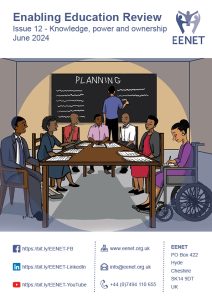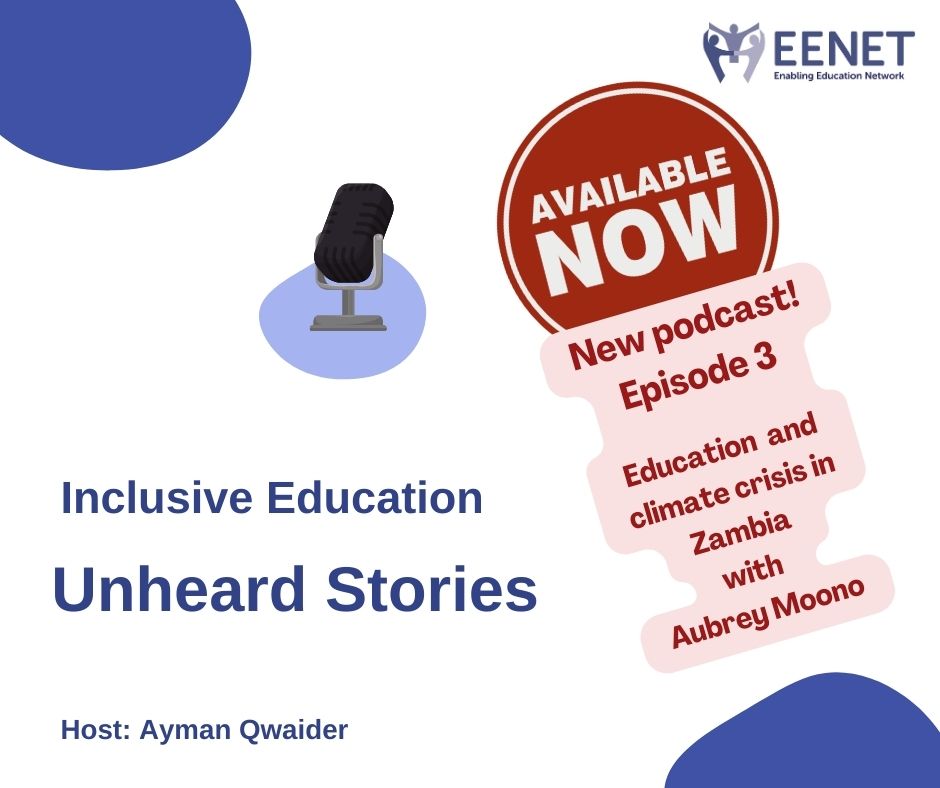Globally, 44 million additional teachers are needed to ensure universal primary and secondary education by 2030. The Teacher Task Force’s #TeachersMissing advocacy campaign for 2024 is sounding the alarm on the urgency of addressing the global teacher shortage. Through this campaign, the Teacher Task Force will harness the collective momentum to address the critical issue of teacher shortages.
Blog
[Publication] Enabling Education Review, Issue 12
EENET is delighted to share our latest edition of Enabling Education Review. It’s available now in PDF and HTML formats.
Theme: Knowledge, power and ownership.
This time, authors offer a variety of insights into education and inclusion issues within the overall theme of “knowledge, power and ownership”. They look at colonialism, language, agency, participation, power relations and more.
There are articles from Afghanistan, Kenya, Nigeria, Palestine, Sierra Leone, UK and various global perspectives.
Enjoy reading!
[Podcast] New episode ‘Unheard Stories’
It’s here! EENET’s third podcast in the ‘Unheard Stories’ series.
The latest episode features Aubrey Moono, an inclusive teacher trainer from Zambia. Aubrey and Ayman chatted about the drought in Zambia and Southern Africa. They discussed how climate crises like prolonged droughts affect children’s school attendance and the measures being taken to support learners. Aubrey also mentioned the possible longer-term impact on education due to drought interrupting teacher training.
Find out more about the ‘Unheard Stories’ podcast series.
**Deadline expired** Principal for Inclusive Education School in Islamabad, Pakistan
Location: Islamabad, Pakistan.
Application deadline: 25 July 2024.
A Principal with experience in inclusive education schools is required for a leading school of 500+ students in Islamabad, Pakistan.
The Principal will be responsible for:
- structuring academic policies;
- lesson planning;
- teacher training and management;
- planning and organising school activities;
- budgets and ensuring administration excellence;
- maintenance of records;
- active relationships with parents and teachers;
- and other vital responsibilities.
Candidates must hold a minimum of 5 years of experience working as a principal in international inclusive education schools.
Salary will be paid in $US. Accommodation/house, car/driver and other benefits will be offered.
Email your resume to nasira.hoori@gmail.com .
** Deadline expired** National Consultant – Capacity building of teachers in Tuzla Canton- cultural responsiveness (UNICEF)
Location: remote (duty station: Sarajevo, Bosnia & Herzegovina).
Duration: 3 days.
Application deadline: 28 May 2024.
UNICEF is looking for a consultant. The purpose of this assignment is to design and implement a 1-day training programme for Tuzla Canton language teachers aiming to capacitate them with knowledge and skills to promote inclusivity in culturally diverse classrooms.
**Deadline expired** Consultant on Inclusive Education in Emergencies, UNICEF
Location: New York, USA.
Duration: 10 June to 13 September 2024.
Application deadline: 21 May 2024.
To contribute to building capacity, UNICEF and the Global Education Cluster are seeking a disability-inclusive education in emergencies consultant to carry out two streams of work: (1) to facilitate and organize knowledge sharing and capacity development events and, (2) to develop tools to improve frontline workers’ access to existing technical resources on disability inclusive education in emergencies.
[Seminar] CaNDER Research Showcase 2024
Date: 7 June 2024.
Time: 10:00 am to 16:45 pm (BST).
Location: Hybrid Zoom and in person: Room GS5, Faculty of Education, Donald McIntyre Building, 184 Hills Road, CB2 8PQ, Cambridge.
The Cambridge Network for Disability and Education Research is running this Showcase Day. The Research Showcase Day is a fantastic opportunity to meet other people working on disability issues, both nationally and internationally, across disciplinary boundaries, and at different career stages.
The day will focus on the following themes:
🔹️ Conflict and climate;
🔹️ Critical reflections on inclusive education;
🔹️ Researching inclusion;
🔹️ Role of evidence in disability and international development.
[Blogs] Climate crisis and education
The climate crisis is already affecting children’s education. We highlight two recent blogs on this issue.
UNICEF’s Ingrid Sanchez Tapia wrote, “On Earth Day, UNICEF urges governments to empower every child with learning opportunities to be a champion for the planet.” The blog presents the outcomes of a rapid survey of UNICEF offices in 94 low- and middle-income countries. It shows inconsistent progress in mainstreaming climate education. “It is alarming to note that 40 of the surveyed countries are assessed as having high or extremely high risk of children’s exposure and vulnerability to the impacts of climate change, yet only a third of these countries reported concrete government action to advance greening education.”
Read: Children and youth call for access to quality climate education.
Save the Children posted news about school closures in Bangladesh: “Extreme heat has forced the closure of all schools in Bangladesh this week, impacting 33 million children, as temperatures soared to 42°C (108 F), 16 degrees more than the annual average”
Read: Bangladesh: Extreme heat closes all schools and forces 33 million children out of classrooms.
**Deadline expired** National consultant for developing a learning assessment framework in inclusive education, Ukraine (UNICEF)
Location: home based (Kyiv, Ukraine).
Duration: 7 months.
Application deadline: 15 May 2024.
The consultancy aims to provide technical support to the Ministry of Education and Science of Ukraine (MoES) in developing an assessment framework for children with disabilities within inclusive education settings. This includes evaluating and recognizing their learning outcomes in adapted and modified educational programmes. The consultant will conduct a comprehensive analysis of current assessment methods, design the assessment framework, and facilitate consultations with key stakeholders, incorporating international best practices. The consultant will work under the direct supervision of UNICEF Ukraine, Education Section, and in close collaboration with the Ministry of Education and Science of Ukraine (MoES), Coordination Centre for the Development of Family Upbringing and Childcare, and relevant stakeholders
[Online course] Inclusive education and universal design for learning
Light for the World and EENET have developed a free online course on Universal Design for Learning (UDL). This fun, interactive course is mainly intended for teachers and educators, but also school or education officers. The course takes about 10 hours and covers how to plan lessons using UDL principles and the importance of collaboration in UDL.


